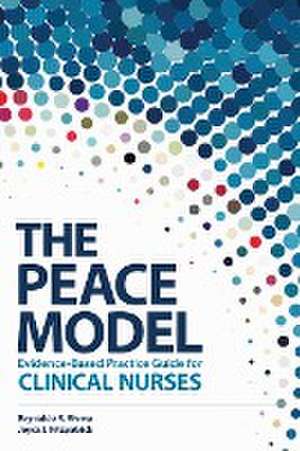The PEACE Model Evidence-Based Practice Guide for Clinical Nurses
Autor Reynaldo R. Rivera, Joyce J. Fitzpatricken Limba Engleză Paperback – 14 ian 2021
Preț: 299.17 lei
Preț vechi: 314.92 lei
-5% Nou
Puncte Express: 449
Preț estimativ în valută:
57.24€ • 59.98$ • 47.32£
57.24€ • 59.98$ • 47.32£
Carte tipărită la comandă
Livrare economică 11-25 aprilie
Preluare comenzi: 021 569.72.76
Specificații
ISBN-13: 9781646480104
ISBN-10: 1646480104
Pagini: 258
Dimensiuni: 152 x 229 x 14 mm
Greutate: 0.35 kg
Editura: SIGMA Theta Tau International
ISBN-10: 1646480104
Pagini: 258
Dimensiuni: 152 x 229 x 14 mm
Greutate: 0.35 kg
Editura: SIGMA Theta Tau International
Notă biografică
Reynaldo R. Rivera, DNP, RN, NEA-BC, FAAN, is the Director of Nursing Research and Innovation at NewYork-Presbyterian (NYP) and Assistant Professor of Clinical Nursing at Columbia University School of Nursing, both in New York, New York. He is also an Associate Professor of Nursing at Frances Payne Bolton School of Nursing, Case Western Reserve University in Cleveland, Ohio. In his current role at NYP, he oversees the implementation of evidence-based initiatives, research studies, and practice innovations that will advance nursing science and improve patient outcomes/care. Rivera's research and contributions focus on nurse engagement and practice innovations including nurse residency program, academic-practice collaboration initiatives, mentoring, narrative nursing, appreciative inquiry, use of liberating structures, and enhancing professional governance. Rivera served as a board member of the American Organization for Nursing Leadership, Advisory Board of the Duke-Johnson & Johnson Nurse Leadership Program, President of the American Association of Critical Care Nurses (AACN) New York City Chapter, and President of the Philippine Nurses Association of America. He is a board member of the American Association for Men in Nursing (AAMN) Foundation as well as an advisory board of the Rockefeller University, Heilbrunn Family for Research Nursing. He has received many prestigious awards, such as the Teachers College, Columbia University Outstanding Alumni Award, AACN Flame of Excellence Award, and the AAMN Lee Cohen Award. He is a fellow of the American Academy of Nursing and of the Academy's Selection Committee. Rivera received his BSN from University of the East Ramon Magsaysay Memorial Medical Center in the Philippines; MA in assessment and measurement psychology from Ateneo de Manila University, Philippines; MA and EdM in nursing executive role from Teachers College, Columbia University, New York; Post Masters in advanced nursing practice from New York University, New York; and Doctor of Nursing Practice from Frances Payne Bolton School of Nursing, Case Western Reserve University in Ohio.
